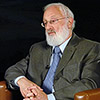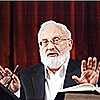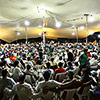 From a letter:
From a letter:
I am a teacher with little experience and I am not Jewish. But I have always been interested in the fact that you teach your children to read from the age of three. I know that a lot of attention is paid to memorizing text.
“You” refers to Jews.
It is known that elementary school children could read the entire Torah fluently from memory. They could even tell how many times and on which page a particular word is mentioned.
I have many questions. Of course, we were taught a lot at university, but your answers are especially important to me. I take a lot from your programs. The first question is: What does starting education at three years old give?
Answer: It gives development.
Question: “What does such rigorous memorization of text give?” she asks.
Answer: It is also memory development.
Question: What is the purpose of this for the child?
Answer: So that they know the Torah well, can recall any part from memory, and quote it.
Question: Why specifically the Torah?
Answer: To develop abilities in a person that cannot be developed by anything else. By nothing else. I have talked with many people who studied the Torah this way, and they say it is impossible to convey this to those who have not studied it. The texts of the Torah “bind” a person’s mind into one harmonious whole.
Question: So in principle, is the goal to bring a person closer to this harmony?
Answer: Yes.
Question: How does a Kabbalist read the Torah?
Answer: A Kabbalist does not read the Torah, they see it. It evokes images within them. Not the ones illustrated in books. They see their own personal images behind the words.
Question: Are all these layers sort of removed?
Answer: This is impossible to explain.
Question: Another question from her: “Progress has brought us to the point where memorizing texts is unnecessary. Information can be obtained instantly. What are the advantages and disadvantages of this, in your opinion?”
Answer: The fact that we can juggle texts, books, and encyclopedias however we want, and find quotes in seconds, is natural, on one hand. But on the other hand, it extracts the soul from all this. It results in pure information.
Question: And is there a soul in learning the Torah this way?
Answer: In this way, yes. Of course!
Question: Her last question: “I have just started teaching. What is the most important thing to teach children?”
Answer: The most important thing to teach children is to have the right attitude toward the material you are teaching them. They must understand that the learning process itself develops them. Therefore, it doesn’t even matter what you study, but the process itself turns a small child into a person.
[330034]
From KabTV’s “News with Dr. Michael Laitman” 4/8/24
Related Material:
What Is The Difference Between The Revealed And The Concealed Torah?
We Should Know How To Read The Torah
The Torah Begins From A Secret
Filed under: Children, Education, News, Q&A, Torah - No Comments →
 Question: How can one convince oneself that any actions for oneself are evil? Even some kind and positive group actions done for oneself are still evil.
Question: How can one convince oneself that any actions for oneself are evil? Even some kind and positive group actions done for oneself are still evil.











